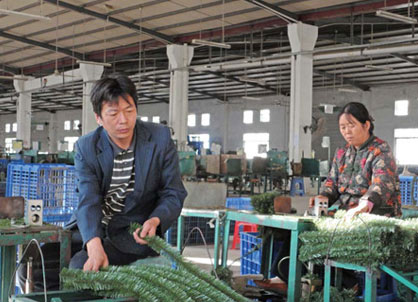A Christmas chill
Updated: 2011-12-16 08:57
By Alexis Hooi and Qiu Quanlin (China Daily)
|
|||||||||
|
 Workers at the King Tree Handicrafts Company's factory in Shenzhen. [Alexis Hooi / China Daily]
|
"The rising wages are a very big challenge for us," King Tree's Peng says.
"Our industry usually requires our workers to work overtime, otherwise we will not be able to fill the orders during the peak season. Our wages can be higher than those at other industries here such as electronics."
The Christmas chill from the economic woes of the West are also being felt among many related businesses in Guangdong's Shantou city, a major toy-producing area in China.
Lin Wei, the head of toymaker Big Tree Toys, says the toy industry is in the midst of a downturn, with smaller businesses more severely affected.
"The whole industry has experienced a 30 percent drop in business, with the crisis in Europe and slow US economy having a marked impact," Lin says.
The 40-year-old started Big Tree almost a decade ago and his toy company is now considered one of the largest of its kind in Shantou, involving sectors such as original equipment manufacturing (OEM), trading, supply chain management, sales, designing and branding. It handles about 400,000 types of plastic toys through more than 10,000 toy-related businesses - half of the number operating in the area. Licensed toys it has helped produce include US brand Barbie and Japanese label Hello Kitty.
The company boasts the largest toy showroom in Shantou. It works with more than 8,000 toy manufacturers and represents more than 300,000 toys and entertainment-related products.
Lin, who is also deputy head of the Shantou chamber of commerce, says Chinese factories churn out about 80 percent of the toys made globally. His company, which relies on more than 90 percent of its business in exports, itself reaped 200 million yuan last year and is expected to take in 300 million yuan this year, Lin says.
"Christmas orders traditionally account for 60 percent to 70 percent of our business, and those from major markets in the United States and Europe have dropped significantly, but our new markets in South America, India and Russia have helped to make up for the shortfall," Lin says.
Similar to Guangdong's Christmas tree makers which are scaling back on frills to make their products more affordable for tightened Western purses, Chinese toy companies like Big Tree that have the means to adapt to market realities are also producing less sophisticated and cheaper toys.
The comprehensive and mature supply chain in their production areas mean these companies can quickly source for materials and manufacture new products for foreign buyers with less to spend.
"When an industry faces the crunch, the weaker and smaller players as well as those which cannot meet quality or service standards will leave the field. Those that are able to survive might actually do better as they seek out new markets with enormous potential," Lin says.
"We are now in such markets as Brazil, Mexico, Argentina In Cuba, we do almost all the toys there now."
But Shantou's toymakers are no longer relying too much on exports and staying beholden to the uncertainties of the global economy.
"We are also investing more in the domestic market," Lin says.











